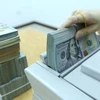Shrimp exporters in Vietnam rejoiced last week when the United States International Trade Commission cancelled anti-subsidy measures on Vietnamese frozen shrimp.
After Vietnam won the lawsuit, the tax rate, which ranged from 1.15 percent to 7.88 percent, was cut to zero and 33 Vietnamese shrimp exporters looked forward to a refund on the taxes they had already paid.
Tran Van Linh, General Director of Thuan Phuoc Commercial and Fisheries JSC, called the lawsuit a “miracle”.
Despite current domestic economic difficulties, shrimp exports remain competitive in the world market, increasing 70 percent in the first eight months of 2013 and reaching 1.7 billion USD in turnover.
The US was Vietnam’s leading shrimp importer, contributing one quarter of the country’s total shrimp export turnover. Vietnam ranked fifth among shrimp exporters to the US, earning 4.3 billion USD from the market last year.
Without the anti-dumping and the anti-subsidy taxes, Vietnamese enterprises hope to find more opportunities to develop their market in the US .
Pham Hoang Viet, Deputy General Director of Sao Ta Foodstuff JSC, told local press that now is an extremely good opportunity for Vietnamese shrimp exporters, as other major exporters such as Thailand and Indonesia are suffering from severe losses due to shrimp disease.
This would decrease the supply from those countries and therefore push up the price, Viet said. US importers would find Vietnam, in contrast, a reliable source of inexpensive products.
However, local exporters remain preoccupied with two big problems: shrimp disease and Chinese traders who try to buy all the shrimp, increasing the price in the local market.
Pham Hai Long, General Director of Saigon Agrex Foodstuff Corporation, said the company could not buy any shrimp from farmers, as they had sold their whole supply to Chinese traders, forcing him to turn down export contracts.
To make the products more competitive, local exporters should carefully check the quality of the shrimp and control diseases, he said.
Additionally, it is necessary to create tax and capital incentives to boost both production and consumption in a sustainable way and deal strictly with traders who intentionally interfered with the market.
The Vietnam Association of Seafood Exporters and Producers (VASEP) has asked the authorities to develop a sustainable production model and address the problem of bad traders, according to Truong Dinh Hoe, the association’s general secretary.-VNA
After Vietnam won the lawsuit, the tax rate, which ranged from 1.15 percent to 7.88 percent, was cut to zero and 33 Vietnamese shrimp exporters looked forward to a refund on the taxes they had already paid.
Tran Van Linh, General Director of Thuan Phuoc Commercial and Fisheries JSC, called the lawsuit a “miracle”.
Despite current domestic economic difficulties, shrimp exports remain competitive in the world market, increasing 70 percent in the first eight months of 2013 and reaching 1.7 billion USD in turnover.
The US was Vietnam’s leading shrimp importer, contributing one quarter of the country’s total shrimp export turnover. Vietnam ranked fifth among shrimp exporters to the US, earning 4.3 billion USD from the market last year.
Without the anti-dumping and the anti-subsidy taxes, Vietnamese enterprises hope to find more opportunities to develop their market in the US .
Pham Hoang Viet, Deputy General Director of Sao Ta Foodstuff JSC, told local press that now is an extremely good opportunity for Vietnamese shrimp exporters, as other major exporters such as Thailand and Indonesia are suffering from severe losses due to shrimp disease.
This would decrease the supply from those countries and therefore push up the price, Viet said. US importers would find Vietnam, in contrast, a reliable source of inexpensive products.
However, local exporters remain preoccupied with two big problems: shrimp disease and Chinese traders who try to buy all the shrimp, increasing the price in the local market.
Pham Hai Long, General Director of Saigon Agrex Foodstuff Corporation, said the company could not buy any shrimp from farmers, as they had sold their whole supply to Chinese traders, forcing him to turn down export contracts.
To make the products more competitive, local exporters should carefully check the quality of the shrimp and control diseases, he said.
Additionally, it is necessary to create tax and capital incentives to boost both production and consumption in a sustainable way and deal strictly with traders who intentionally interfered with the market.
The Vietnam Association of Seafood Exporters and Producers (VASEP) has asked the authorities to develop a sustainable production model and address the problem of bad traders, according to Truong Dinh Hoe, the association’s general secretary.-VNA



















